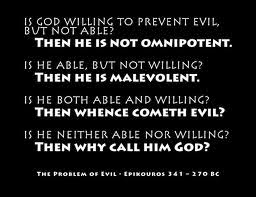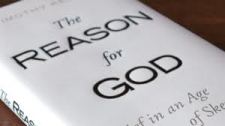This post was put together from the power point slides of a presentation given by my soon-to-be sixteen-year-old, Ethan Spikes. He delivered this presentation in front of 19 fellow students and a teacher.
What is it?
The problem of evil is THE argument used in favor of God not existing. It is the objection that an all powerful and all loving God does not reconcile with the existence of evil. There are two parts to the intellectual version of this problem: the logical problem (if evil exists, then God cannot), and the evidential problem (it is improbable that an all loving and all powerful God would let suffering exist). The emotional problem of evil deals with a non-intellectual rejection of God based in feelings. I will focus on the intellectual first.
The Logical Version
1. God is said to be all powerful and all good.
2. An all powerful god could abolish evil.
3. An all good god would want to abolish evil.
4. If evil exists, then God (see reason one) cannot exist.
5. Evil exists: Watch the news.
6. Therefore, God (see reason one) cannot exist.
This is a valid deductive argument.
To Abolish or to Permit
The logical version, though deductively valid, is not necessarily sound. It is answered by challenging reason 3, which says that an all good god would want to abolish evil. Though a good god would hate evil, he would not want to abolish the possibility of evil if he has good reasons to permit it, such as allow free will, which I will talk about in a bit.
The Evidential Version
The evidential version states that it is improbable that an all loving and all powerful God would have good reasons to permit evil and suffering.
Five Possible, Unsatisfactory Solutions
1. God is not all good
2. God is not all powerful
3. God does not exist (atheism)
4. Evil does not exist (again, watch the news)
5. Karma and reincarnation
Answering “God Is Not All Good”
Another way to look at this issue is by identifying evil relative to good (God).
1. Good is the way things are supposed to be.
2. Good must first exist before evil can mess it up.
3. There is only one candidate for an all good being (God).
4. Therefore, if evil exists, God (an all good being) must exist.
Examples of similar relationships: Cheese must first exist before cheese mold. A car must first exist before rust can mess it up. An eye must first exist before blindness.
God, History, and Hell
Some say the God of the Old Testament (or Tanakh according to Jews) is evil, because he ordered the slaughter of so many people. That is addressed in “Is God a Moral Monster” by Paul Copan, which I am studying this summer if you’d like to join me.
Hell is a necessary alternative for eternal souls to choose love.
Define Good!
Some object that saying that God is good does not define what good means.
Once a definition is given (for example, the Golden Rule), they say it would be the definition even if God did not exist.
However, unless a perfect being exists, a definition is just a man-made theory that is true to nothing.
Because God said so?
Some object that God makes up what is good with his laws and commandments.
In actuality, he cannot make it up, because that would be lying, which would compromise his perfection, which I have shown to be impossible.
God’s laws and commands come from his perfect nature. He IS the standard. He is all good.
Answering “God Is Not All Powerful”
Some attempt to get God off the hook for evil by believing in a god that is powerless to stop natural occurrences or determine everything from the beginning to the end, including freely willed choices. But, a weak god, like a god that is not all good, is a god unworthy of the title.
Answering Atheism (God does not exist)
– Since it doesn’t work that there is a god that is not all powerful or all good, some believe that there is no god. Some atheists do not believe in objective morality or the evil that messes it up. However, atheists who find evil to be a problem try to ground the source of objective morality in nature. Consider this:
– If someone is raped and they get pregnant, the result is another member of the species, which increases the likelihood of survival for that species. Clearly, survival is not the point.
– To what good being is atheist morality true? No being in nature is all good.
– Therefore, this is an even bigger problem for the atheist.
The Problem with the Problem Of Evil
The problem of evil may be a problem for theists, but it is an even bigger problem for those who argue that God cannot exist if evil exists.
On the one hand, they recognize that something is wrong. On the other hand, they deny the reality of something that is right (an all good God). But goodness must first exist for evil to mess it up. No God, no evil.
Answering Karma and Reincarnation
All different branches of Buddhism and Hinduism deny the existence of a substantial and personal soul and believe the self is nothing but an illusion created by combining separable parts (skandhas). However, since karma has no self to work on and your experiences cannot carry on after you die, no one should be able to experience good or bad karma. In addition, if there is no God, who is keeping the karma record?
The Greater Good of a Free Will
The greater good defense says this to the evidential version: God may have good reasons to permit suffering. For one, it allows free creatures to love or reject him. For another, there are levels of love and happiness only reached through suffering. Other reasons may only be seen from God’s timeless perspective.
The free will defense states that God cannot create creatures that love against their will, for love must be a freely willed choice.
Free Will and An All Powerful God
Some object that free will is impossible if God determines all our choices (which he must, if he knows and sustains everything from beginning to end), and that if we determine our choices, then God is not all powerful. However, it is possible from God’s position to determine that we freely choose, and it is impossible for us to freely choose unless it is determined, meaning that God is all powerful.
That God won’t force us to love against our will just means he is good and not a dictator. But, also…
Can God make a rock so big…?
Forced love not only strikes us as evil–it is an illogical oxymoron that has no meaning (like a rock so big God can’t lift it). Genuine love is chosen, not forced. God cannot do the meaningless. He also cannot violate the goodness of his nature.
That God cannot make us love against our will — (or a rock so big he can’t lift it) — is due to the fact that he is the source of logic and order. He can’t defy himself and remain God.
The Problem of Evil Is Evidence FOR God
– Could there be any such thing as evil if good did not preexist it?
– Since nothing in nature is all good, those who object to evil must look for the source of goodness outside of nature.
The Emotional Problem of Evil
There is an even bigger problem fueled by suffering. Despite the failure of the intellectual argument from evil, many are unable to accept the idea of God being “off the hook” for suffering, because their objection is based in feelings, not reasons. In response, I will say that they are correct: In fact, God put himself on earth to be “on the hook” for human suffering.
The Solution to the Emotional Problem
Reflecting on Jesus’ death. Jesus faced his impending doom with agony. When compared to the Maccabean martyrs, who were burned alive and still seemed joyous to die for God, Jesus seemed weak and unable to stop what was happening, yet the martyrs laughed at their pain and praised God as they burned. In the end, Jesus said, “My God, My God, Why have you forsaken me?”
Why did he say this?
Jesus’ faith is strong in suffering.
“Jesus’ cry of dereliction–‘My God, my God, why have you forsaken me?’–is a deeply relational statement [with] ruthless authenticity. …Jesus did not die renouncing God. Even in the inferno of abandonment he did not surrender his faith in God but expressed his anguished prayer in a cry of affirmation, ‘My God, my God,’ …even as he experienced infinite separation from the Father.”
–Bill Lane in Tim Keller’s, “The Reason for God”
There is hope in suffering.
Another reason Jesus said, “My God, my God, why have you forsaken me,” is because he was quoting Psalm 22, which–though it begins in suffering–ends in praise.
Jesus knew his suffering was not eternal.
Forgiving Evil
Jesus’ suffering demonstrates the way God deals with human evil–he neutralizes it through self-sacrificial forgiveness. His goodness (love) never changes.
He cannot force us to choose that forgiveness, but for those who do, he commands us to pay it forward.
Disclaimer: Forgiving does not mean failing to resolve conflict or protect others.
Further study:
I used these books in my research, and I highly recommend them:
The Reason for God by Tim Keller
On Guard by William Lane Craig
Christian Apologetics by Douglas Groothuis
Handbook of Christian Apologetics by Peter Kreeft and Ronald K. Tacelli










